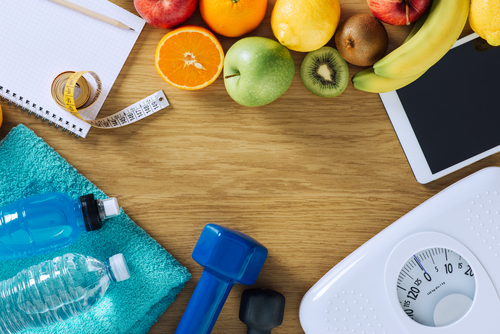The weight loss industry is HUGE. There is always a new fad “diet” out there, a quick fix, a promise for fast results. Although a lot of these methods do work fo the short term, the majority of the weight (and sometimes even more) will creep back on in the years to come. For successful weight loss over the long term there needs to be a slow and steady change in not only your diet, but your lifestyle as well. “How does she know this” you may be wondering. Well let me share a bit of my journey with you.
Since I hit puberty I have always had some extra weight on me, never have I been a “skinny” person. While I was in university I had put on some weight – “the freshman 15”. I had stayed active, loved going to the gym with my housemates, trained Brazilian Jui Jitsu and loved Zumba classes – but the weight was still there. The first year I was with my partner I had put on a bunch more weight. At my heaviest my weight was 224 lbs. I carried it well on my 5’7″ frame, but I felt it when I couldn’t walk up a hill without being out of breathe. Over the next 2 years I took control of my diet, my lifestyle, my mind and my body. I lost 50 lbs reaching my lowest adult weight of 174. Then I became pregnant with my first baby. I cannot tell you how much I weighed by the end of my pregnancy because I never weighed myself. I had just worked so hard to see that number on the scale go down, that I couldn’t play that mental game again of watching the number rise – even if it was due to growing a beautiful being. 9 months after my love bug was born (March 2017) I was back down to 187lbs – 13lbs away from my lowest pre baby weight! 3 days later I found out I was pregnant again – for this pregnancy I did weigh myself, gaining around 30lbs. I am now 3 months postpartum for the 2nd time in 2 years – my weight loss journey is far from over. I have a feeling there is no real “destination” on this journey – but I do have some great tips that can help with weight loss that I have learnt thus far on my journey.
10 Tips For Weight Loss
Reduce Stress
Stress releases Cortisol into the body, a hormone that raises the insulin levels in the body to help aid in acute stress situations, such as if you need a quick energy boost to run from a bear. It also increases the body’s appetite. Caffeine, sugar, high fat foods can all stimulate the nervous system, increasing agitation and stress in the body. Cortisol also breaks down the collagen (connective tissue) in the body, increasing the risk of heart attack, stroke, kidney disease, depression, anxiety and insomnia. Some tips on reducing stress include practicing yoga, meditation, taking deep and mindful breathes throughout the day, getting proper sleep, and maintaining an exercise routine.
Eat Real Food
Eat foods as close to their natural state as possible. Natural unprocessed foods provide the best source of nutrients that the body needs. Avoid refined and processes foods, including “white” foods (white rice, white flour, white pasta, etc.). Always read the labels of packaged foods, avoid foods that have a lot of ingredients that you cannot pronounce or recognize.
Avoid Artificial Sweeteners
Artificial sweetener confuses the body, creating more cravings for sweet foods. They are also do not contain any nutrients for the body. A good substitution is stevia, a plant based sweetener. Maple syrup and honey are also good alternatives, but should only be consumed in small amounts to avoid raising the blood sugar levels too much.
Eat High Fiber Foods
Fiber not only helps to keep the body’s elimination system regular, it also helps to reduce spikes in blood sugar levels, and helps to keep you feeling full between meals. Some high fiber foods include lentils, beans, peas, broccoli, berries, avocados, pears, apples, and oatmeal. Try adding some flax seeds, chia seeds and hemp seeds to your meal for some added fiber!
(Bean Tip: to help reduce the amount of gas you get from beans, soak them before you eat them! Canned or cooked from a dried state, soak them for 6-8 hrs to help remove some of the anti-nutrients such as physic acid to make them easier to digest.)
Control Blood Sugar
Keeping the body’s blood sugar levels stable will help to control the insulin response in the body. The goal is to try to keep it at a steady level instead of raising it rapidly, which will be followed by a drop in the blood sugar levels. This will allow the body to work more efficiently, using fat stores in the body for fuel between meals. A steady blood sugar level also helps to keep your mood stable, avoiding a state of being “hangry”. To keep the blood sugar levels balanced it is important to eat every 2-3 hours. Studies have also shown that adding cinnamon to your diet helps to control blood sugar levels. Try to eat foods that are low on the Glycemic Index (think apples, pears, bananas, beans, nuts, whole grains, brown rice, sweet potato, carrots). Maintaining a balanced blood sugar level throughout the day also decreases cravings for sugary, nutrient void, foods.
Eat Breakfast
Breakfast is literally breaking an overnight fast. After starting with a warm or room temperature glass of water (lemon is a great addition too), focus on providing your body the right fuel to start the day after it has had a night of resting and repairing. High fiber foods and proteins will help stabilize the blood sugar and has also been shown to improve focus and concentration in the morning hours. If your body has a hard time consuming complex foods first thing in the morning then have a piece of fruit then consume a complex food 30 – 45 minutes later (such as mixed nuts and seeds, oats, eggs, etc.).
Stay Hydrated
Water. Water. Water! The body cannot differentiate between the feelings of hunger and thirst very well. When we confuse thirst for hunger we often eat before we need to and consume more food than necessary in a day. The water content in our food also counts toward our daily water intake; most fruits and vegetables have high water content. The body needs approximately 8-10 glasses of water a day, more in the summer and with physical activity, less in the winter. Any caffeine consumed will cause dehydration in the body, have an extra glass of water every time a coffee/tea is consumed. Caffeinated drinks should be limited to 1 per day. Avoid drinking 15 minutes before a meal and with a meal as this will dilute the stomach acid and can cause digestive issues. Water should also be the main choice of drink; juice and pop should be avoided.
Exercise
Use it or lose it – a body in motion stays in motion. Staying active is important to any healthy life style. Dedicate at least 30 minutes a day to exercise. Gentle exercise ideas include: walking, hiking, swimming, yoga, and pilates. Not only does physical exercise help to tone muscles in the body, lose weight, and keep the joints healthy, but it also helps our mental health by releasing endorphins (feel good hormones) into our body and helps manage stress. Exercise has also been known to keep our mind and body healthy as we age, helping to prevent age related illnesses.
Be Mindful
Being mindful means focusing on your food, eating with the intention to fuel your body. Chew it well and do not rush your meal or eat while you are distracted by the TV, or driving. Creating a connection between the mind and body when you consume foods will help the body digest the foods, allow you to recognize what being full feels like before reaching an over full state, and reduces stress on the digestive system. Being mindful also means to focus on what you are choosing to put into your body, you have control over what is allowed to enter your body. Your body is your home, this is the place that you have to live in. This is the only body that you have, yet most people don’t prioritize taking care of it and put it as a last priority. Put yourself first, be mindful with what feels right for your body and honour it. Honour yourself. Be mindful that weight loss is a slow and steady process; do not expect drastic results right from the start and don’t put the pressure of unrealistic goals on yourself. A healthy rate of weight loss is 1-2lbs a week.
Be Prepared
The only way to succeed in taking care of your body and control of your weight is to be prepared. By having your meals and snacks prepared for the day you are leaving no room for poor decisions that lead to junk food. No room for over eating and you can ensure that you are eating foods that you have chosen. Whenever leaving the house, for work or otherwise, ensure that you bring your food with you. Pack a food bag that will cover any meals or snacks that you will need while you are out. This will give you no excuses for consuming junk food or convenient nutrient void foods. Doing a meal prep 1-2 days a week will help you have foods ready to go in the fridge. Cut up veggies already portioned out, have apples on hand that can be grabbed quickly when a snack is needed, and get excited about leftovers – they are ready to go meals! Even if you will be at home for the majority of the day, have food planned and ready to go for when it comes time to eat. And be prepared to say “no thank you” to foods that you are choosing not to put into your body.
I hope that you find some of these tips helpful to you, whether you are on a “weight loss” journey or not. These tips can help you live your healthiest life, at any weight.



